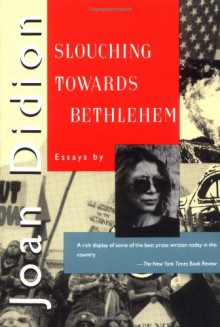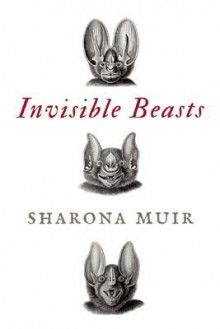
I feel uneasy about reviewing Joan Didion's Slouching Towards Bethlehem. That it is, the idea of writing an essay about a collection of essays combines with something in her voice that makes me very aware that I am creating a sort of Russian nesting doll of commentary, but I will attempt it all the same.
For a while I had known Joan Didion to be a giant in the field of creative nonfiction but only last year did I actually get around to reading The White Album. The writing itself is all very good. I think she is the kind of prose stylist one should read and re-read especially if one intends to write themselves. She embodies the clear and to the point writing that was called for by George Orwell. It looks you right in the face and you can see it plainly, describe it, but it escapes caricature, you couldn't pick it out of a lineup based on anything less than a full paragraph. Having since encountered an especially overwrought and meaningless essay in a popular literary journal, I have come to feel that a revisiting of her work should maybe become an annual thing for writers, a sort of spring cleaning for minds that have a tendency to climb up their own asses.
In a very limited sense, not every essay of hers works for me. I don't know that I have any real qualification for this except that she has honed this voice, and it seems to me that sometimes it just either catches you or it doesn't, and even when it doesn't, the results are still very good. The titular essay, “Slouching Toward Bethlehem” does a fine job of bringing the phenomenon now known as the “Summer of Love” into personal terms. What it meant to be there, who these people were (beyond the caricatures that people of my age have grown up with), and how they lived. That I fail to connect with it seems as likely my own problem as anything else. That she talks about it in the prologue as something Important could also have put me off it. Part of what makes her essays great is that she understands that the easiest way to miss the point is to aim straight for it. There is something mush more revealing in the vignettes, scenes of Joan Baez at a Community Board meeting or a note about the woman in the fur coat at the end of the bar that say so much more about the time, the author, and ourselves than could be formalized into a statement of fact.
When it does catch, which is often in my experience, the results are amazing, and it is easy to see how readers grow personally attached. To read “On Self-Respect”, “Goodbye to All That”, or “Where the Kissing Never Stops” is an experience. They have an ability take you out of your own head and spin you around a couple times, force you to look at the same place you just were as if it is something new that you have never seen before. “On Self-respect” is a wonderful one that I have been wrestling with since I first encountered it in college. At first I battled with it. She uses some unattractive examples which is kind of the point. She doesn't prescribe a set of rules, but asks us to find our own and to live by them. It is not nearly as easy a concept as it seems but it is something that readers should reckon with, an idea that you ought to think about whether you wind up accepting it or not.
“Some Dreamers of the Golden Dream” is a study in the way we consume news as entertainment and how we understand true crime stories even as it sells us another crime story. It has an ending that drastically changes everything you had read. It is not a twist, though she writes it in a way that you would write a good twist. The last lines are revelatory, she gives you a peek at her hand and suddenly you catch on to all the subtle points she had strung along the way. She brings up doubts in the case but refrains from making accusations. Still, she leaves you with pieces of a puzzle, whose story wavered, who benefited or withheld information. The last sentence puts a cherry on it, but you feel as if you have done all the work yourself. As writing, it's impressively done.
That Joan Didion struggles with things like morality and the counter-culture is even more reason to appreciate her work. The scariest thing for any writer taking on current events with a wide lens—it is easy to miss as a journalist when there are immediate cases to attend—is the lack of answers. How does one move forward from this? Whether we talk about the schism in culture or the corruption in politics. It is easy to find the truly bad—forty years on and I can name companies that you and I deal with daily that are ethically abhorrent yet impossible to avoid—but how do we get from there to good? She sees the horror of the establishment but also the naivete of the reaction. She is the clear minded counterpart to Hunter S. Thompson. They are disillusioned and searching for answers, tired of empty shouting, and hoping to strike into something deeper.
The simple truth, Joan Didion is one of the greatest writers of the last one hundred years. Her work stands without a hook or gimmick, without a rallying cause or philosophy, it is just clear, smart, and direct. I think you would enjoy reading Joan Didion and I think you should read Joan Didion, especially if you are writing for an emergent literary magazine.


 Log in with Facebook
Log in with Facebook 









